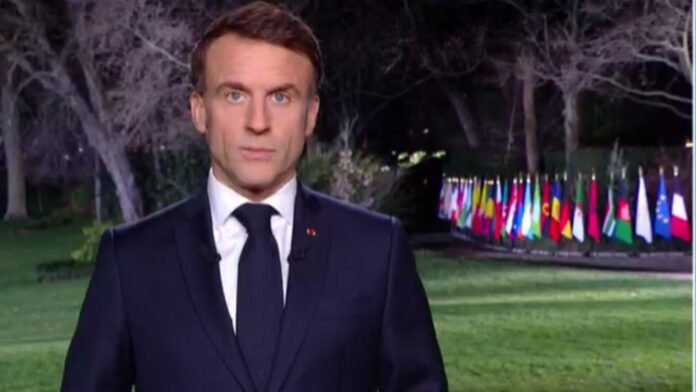
French President Emmanuel Macron outlined his vision for a revitalized nation, promising both civic and economic “rearmament” for France.
Against the backdrop of Olympic flags representing nations from around the world, Macron stressed the critical choices that lie ahead for voters in the upcoming European elections in June.
Drawing parallels to the late Jacques Delors, a former European Union leader who passed away recently, Macron asserted that voters face a decisive crossroads – a choice between “continuing Europe or blocking it.”
He urged the nation to opt for a path that leads to a “stronger, more sovereign Europe” in honour of Delors’ legacy.
The president’s address comes at the close of a challenging year marked by contentious reforms and civil unrest. Macron’s government pushed through highly unpopular pension reforms, prompting summer riots following the police killing of youths.
More recently, a controversial immigration bill backed by the far right exposed internal divisions within the government. Macron himself has not been immune to criticism.
Earlier this month, he faced backlash for expressing support for film icon Gerard Depardieu, who is facing charges of rape and numerous sexual assault allegations.
The president’s handling of the Middle East crisis, triggered by Hamas’s attack on Israel in October, has also drawn scrutiny.
Despite Macron’s call for a lasting ceasefire during a recent phone conversation with Israeli Prime Minister Benjamin Netanyahu, the situation in Gaza remains volatile.
The president affirmed France’s commitment not to forget the hostages held by Hamas and the 41 French citizens killed during the attack. However, his plea for a lasting ceasefire has, so far, fallen on deaf ears.
As Macron navigates these challenges, the looming European elections add another layer of complexity to the political landscape.
The contrasting options of “continuing Europe or blocking it” underscore the broader debate over the direction the European Union should take.
The legacy of Jacques Delors, who played a pivotal role in shaping the European project, serves as a poignant reminder of the stakes involved.
Macron’s call for a “stronger, more sovereign Europe” echoes Delors’ vision and sets the tone for the upcoming elections.
The months ahead will undoubtedly test Macron’s leadership and the resilience of his government.
The choices made by French voters in June will not only shape the future of their nation but will also send ripples through the broader European landscape.
As Macron stands at this crucial juncture, the path he chooses and the support he garners will be pivotal in determining the trajectory of France and its role in the evolving European narrative.